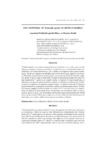
Please use this identifier to cite or link to this item:
http://ricaxcan.uaz.edu.mx/jspui/handle/20.500.11845/832Full metadata record
| DC Field | Value | Language |
|---|---|---|
| dc.contributor | 120273 | es_ES |
| dc.contributor.other | https://orcid.org/0000-0003-1324-4488 | - |
| dc.coverage.spatial | Global | es_ES |
| dc.creator | Moreno García, María Alejandra | - |
| dc.creator | Maldonado Tapia, Claudia | - |
| dc.creator | García Mayorga, Elda Araceli | - |
| dc.creator | Reveles Hernández, Rosa Gabriela | - |
| dc.creator | Muñoz Escobedo, José Jesús | - |
| dc.date.accessioned | 2019-03-22T20:51:17Z | - |
| dc.date.available | 2019-03-22T20:51:17Z | - |
| dc.date.issued | 2009-01 | - |
| dc.identifier | info:eu-repo/semantics/publishedVersion | es_ES |
| dc.identifier.issn | 0120-548X | es_ES |
| dc.identifier.issn | 1900-1649 | es_ES |
| dc.identifier.uri | http://localhost/xmlui/handle/20.500.11845/832 | - |
| dc.identifier.uri | https://doi.org/10.48779/7dgd-bb97 | - |
| dc.description | Trichinella spiralis is a parasitic disease in man, rat, pig, but can infect any carnivorous or omnivorous. When the meat or their derivates are contaminated with infective larvae (il) of T. spiralis pass to the stomach, their capsules are dissolved by the stomach juice, the larvaes are liberated in few hours, and then they pass to the near portion of the slim intestine in which they develop. The objective of the present work was to evaluate the intestine phase of T. spiralis in a murine model. Fourtyfive Long Evans rats were infected with 500 li approximately, then 3 rats were sacrificed everyday over a period of 15 days. A portion of duodenum, jejune and ileum were fixed in formaldehyde 10% and subsequently embeded in paraffin and dyed with hematoxilin-eosina. The rest of the slim intestine was cut and fractionated and incubated at 37 ºc for 2 hours; the supernadant was observed unde light microscopy. We observed that the implant of larvae was in the jejune and ileum. The adult females gave origin to approximately 60- 80 newborn larvaes (LRN) and subsequently were destroyed. The adult male had nonciliated sperm. | es_ES |
| dc.description.abstract | Trichinella spiralis se encuentra principalmente en el hombre, rata, cerdo, perro; puede infectar a cualquier carnívoro u omnívoro. Cuando la carne o sus derivados están contaminados con larvas infectantes (LI) de T. spiralis y son ingeridas éstas pasan al estómago, donde sus cápsulas son disueltas por acción de los jugos gástricos, las larvas son liberadas en pocas horas, después pasan a la porción proximal del intestino delgado, donde se lleva a cabo su desarrollo. El objetivo del presente trabajo fue evaluar la fase intestinal de T. spiralis en un modelo murino. Un lote de 45 ratas Long Evans, se infectaron con aproximadamente 500 LI, y fueron sacrificadas tres diarias por 15 días. Se tomó un segmento de duodeno, yeyuno e íleon y se fijaron en formol al 10% para posteriormente ser procesados en parafina y teñido con hematoxilina-eosina. El resto del intestino delgado fue fraccionado, se incubó a 37 ºC por dos horas y el sobrenadante se observó al microscopio de luz. Se encontró que el implante se lleva a cabo a nivel de yeyuno e íleon, que las hembras adultas dan origen aproximadamente 60-80 larvas recién nacidas (LRN), parto vivíparo en un tercio distal y subsecuentemente son destruidas. Los machos adultos tienen espermatozoides no ciliados. | es_ES |
| dc.language.iso | spa | es_ES |
| dc.publisher | Universidad Nacional de Colombia | es_ES |
| dc.relation.uri | generalPublic | es_ES |
| dc.rights | Atribución-NoComercial-CompartirIgual 3.0 Estados Unidos de América | * |
| dc.rights.uri | http://creativecommons.org/licenses/by-nc-sa/3.0/us/ | * |
| dc.source | Acta biológica colombiana, | es_ES |
| dc.subject.classification | BIOLOGIA Y QUIMICA [2] | es_ES |
| dc.subject.other | larvas infectantes | es_ES |
| dc.subject.other | adultos | es_ES |
| dc.subject.other | larvas recién nacidas | es_ES |
| dc.subject.other | Infectant larvae | es_ES |
| dc.subject.other | adult | es_ES |
| dc.subject.other | recently born larvae | es_ES |
| dc.title | Fase intestinal de Trichinella spiralis en modelo murino Intestinal Trichinella spiralis Phase In Murine Model | es_ES |
| dc.type | info:eu-repo/semantics/article | es_ES |
| Appears in Collections: | *Documentos Académicos*-- UA Ciencias Biológicas | |
Files in This Item:
| File | Description | Size | Format | |
|---|---|---|---|---|
| Fase Intestinal 2009..pdf | 3,51 MB | Adobe PDF |  View/Open |
This item is licensed under a Creative Commons License
